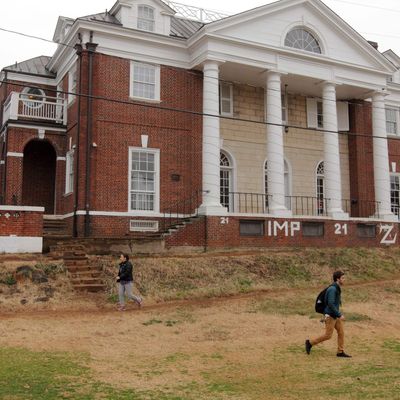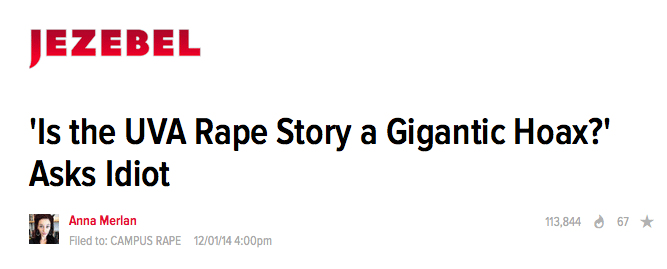
The Columbia Journalism Review’s examination of Rolling Stone’s since-retracted report of an alleged rape at the University of Virginia is, on its own terms, a masterpiece of forensic meta-journalism. CJR has expertly deconstructed the methodological failure that led Rolling Stone to publish a report rife with easily verifiable falsehoods. And yet the terms of CJR’s report are oddly constrained. Its intensive focus on the story’s failures of reporting and editing ignores the obvious (though harder to pin down) ideological assumptions that produced those failures. “The problem was methodology,” CJR concludes, “compounded by an environment where several journalists with decades of collective experience failed to surface and debate problems about their reporting or to heed the questions they did receive from a fact-checking colleague.”
But why did Rolling Stone flagrantly disregard basic journalistic safeguards in this instance? It seems very likely that the magazine’s staff was operating within a social and ideological environment that made the story’s narrative appear to be self-evidently correct.
Of course, we don’t know what form Rolling Stone’s social and ideological assumptions took, since CJR does not explore them. But if the magazine’s approach to its story in any way reflected the assumptions of the liberal journalists who embraced it after its debate, then the magazine’s suspension of its normal journalism standards makes a great deal of sense.
One of the peculiar, unexamined assumptions is that fraternity members are capable not only of loutishness or even rape, which is undeniable, but the sort of routine, systematized torture we would normally associate with serial killers or especially brutal regimes. The story describes a gang rape as a fraternity initiation ritual, complete with members referring to their victim as “it,” the way Buffalo Bill dehumanized his captive in Silence of the Lambs.
You don’t need to feel much affinity for Greek culture — I certainly don’t — to question whether depravity on this scale is plausible. It’s the sort of error that could only be produced in an atmosphere of unquestioned loathing. Caitlin Flanagan, who has reported extensively on the pathology of fraternity culture, told Hanna Rosin that Rolling Stone’s gang rape scene beggared belief. But Flanagan and Rosin have both offended the left in different ways, so their skepticism merely served to convince Rolling Stone’s defenders that the story’s skeptics were motivated by anti-feminism:
The second problem was a habit of left-wing thought treating rape accusations as a unitary phenomenon, rather than something that needs to be understood on a case-by-case method. When the first troubling signs about the factual veracity of Rolling Stone’s account surfaced, the story’s defenders reacted with incredulity. As Salon’s Katie McDonough put it, “So many of these protests about ethics and transparency are just the latest cover for the same tired bullshit: derailing public conversations about rape so that we will talk about virtually anything else.” The public atmosphere on the left allowed little room for even mild skepticism of the story’s veracity:

Again, since CJR does not (or perhaps cannot) show us the ideological environment within Rolling Stone, we can’t know what the magazine’s writers and editors were thinking. But if their mentality in any way reflects the mentality of their outside allies, they would have walled themselves off from all doubt by treating skepticism of any single rape allegation as skepticism of all rape allegations. The story’s defenders did not merely apply the understandable impulse to not dismiss a woman’s testimony about rape; they described its critics, whose factual qualms were well-founded, as “rape apologists” or “rape deniers.” Their ideological approach makes it nearly impossible to explore the factual basis of a story.
Indeed, Amanda Marcotte, who mocked skeptics of the story in December, has a new column headlined, “Sorry, Rape Deniers, the Rolling Stone report isn’t what you hoped.” In a sense, she is right. But the fact that CJR constructed its report on Rolling Stone in such a way that it could be held up as vindication by the very people who dismissed Rolling Stone’s critics as deranged misogynists suggests that it may have avoided the most important question.






























